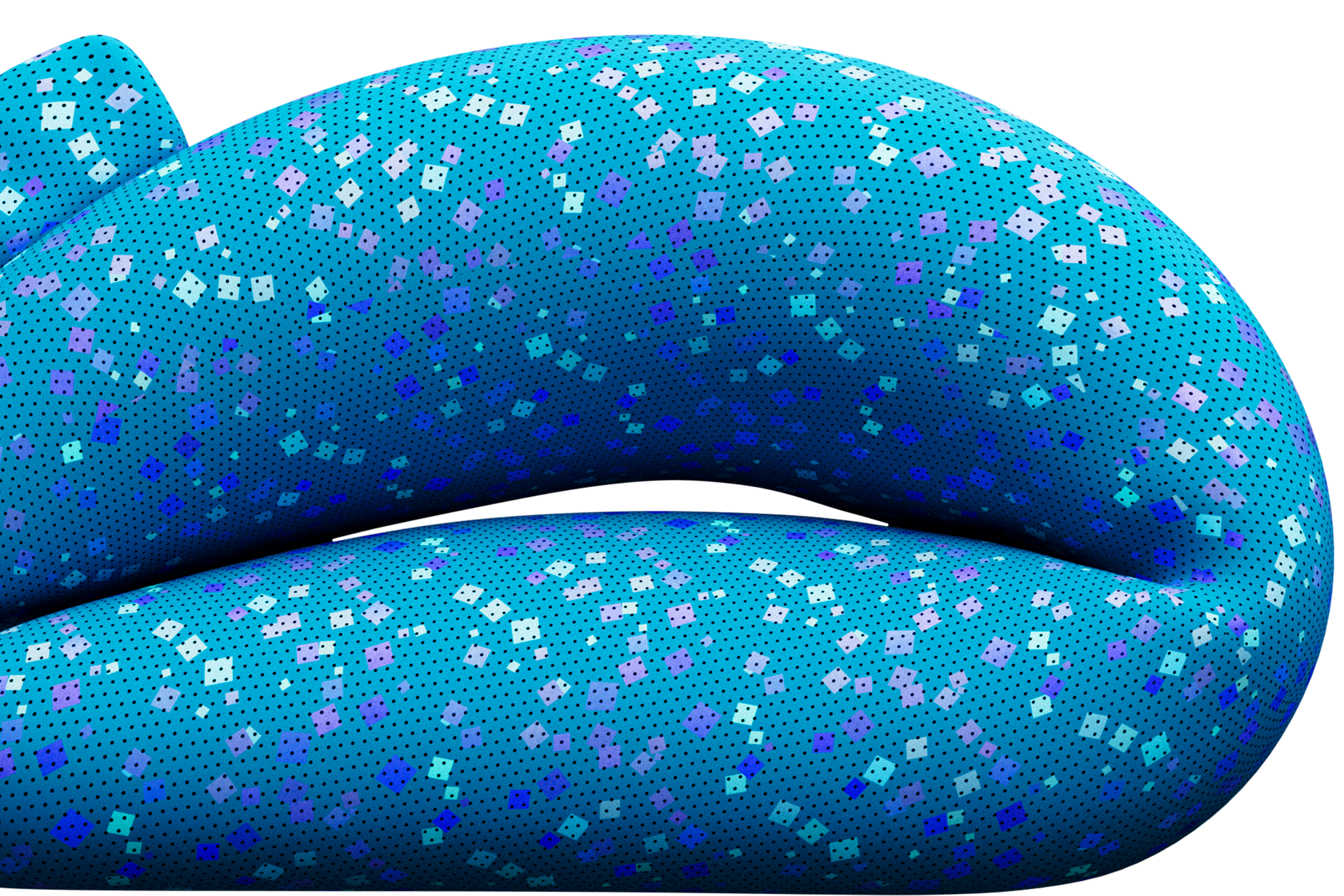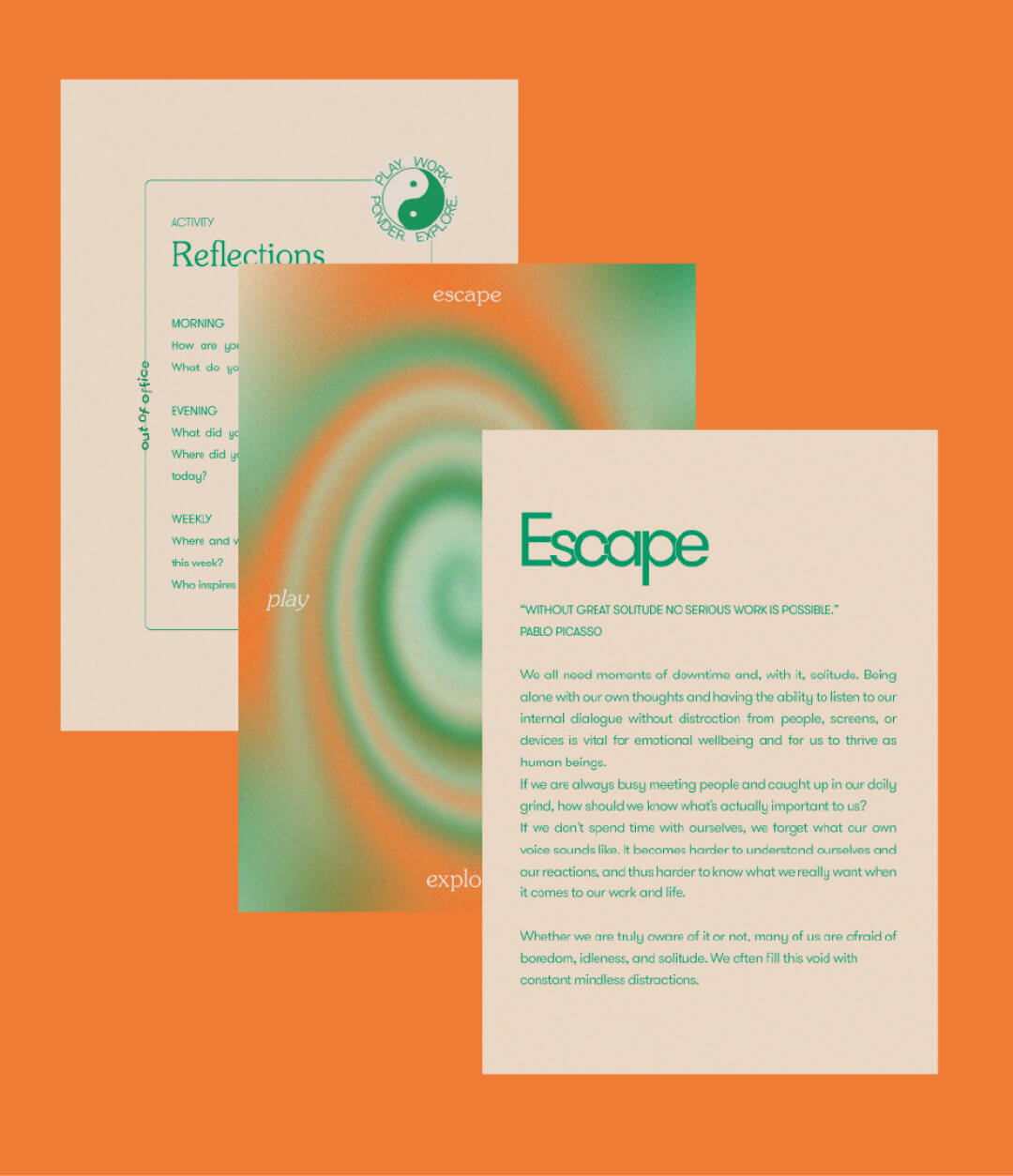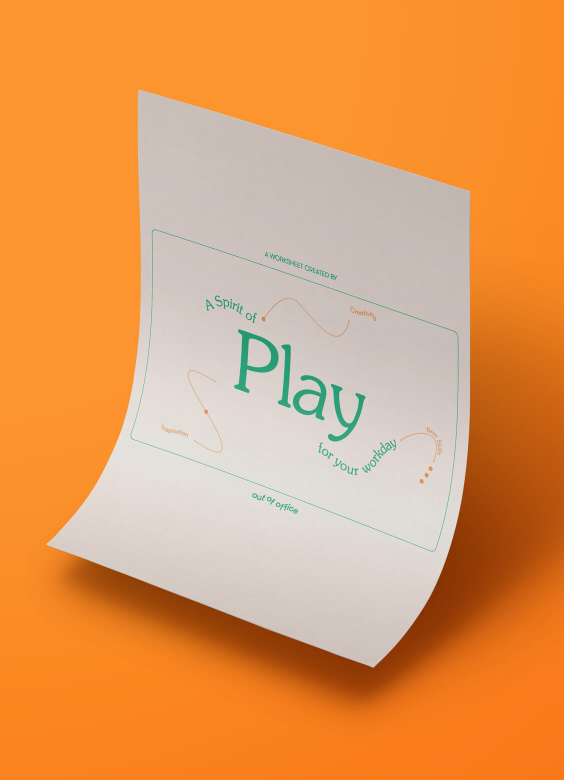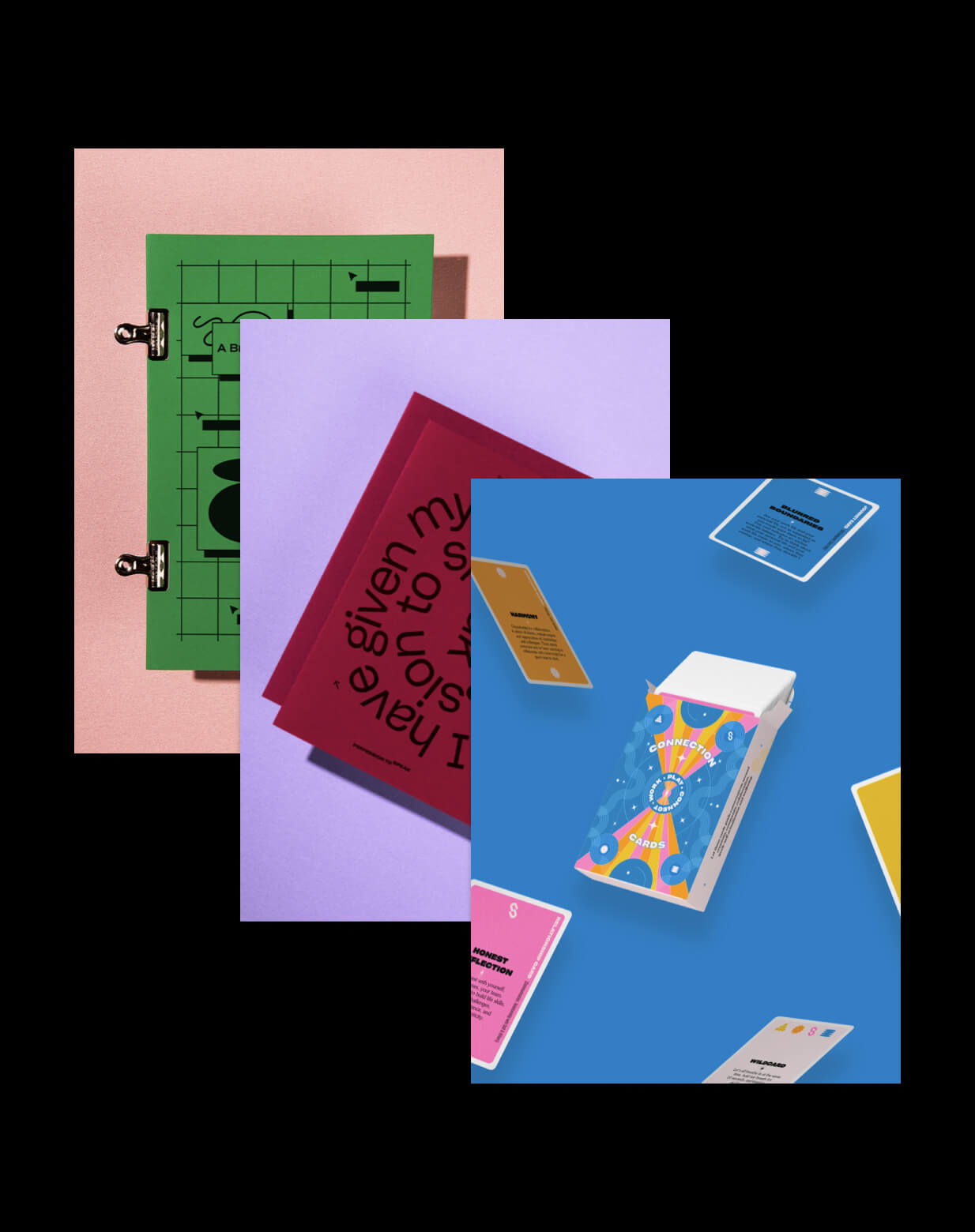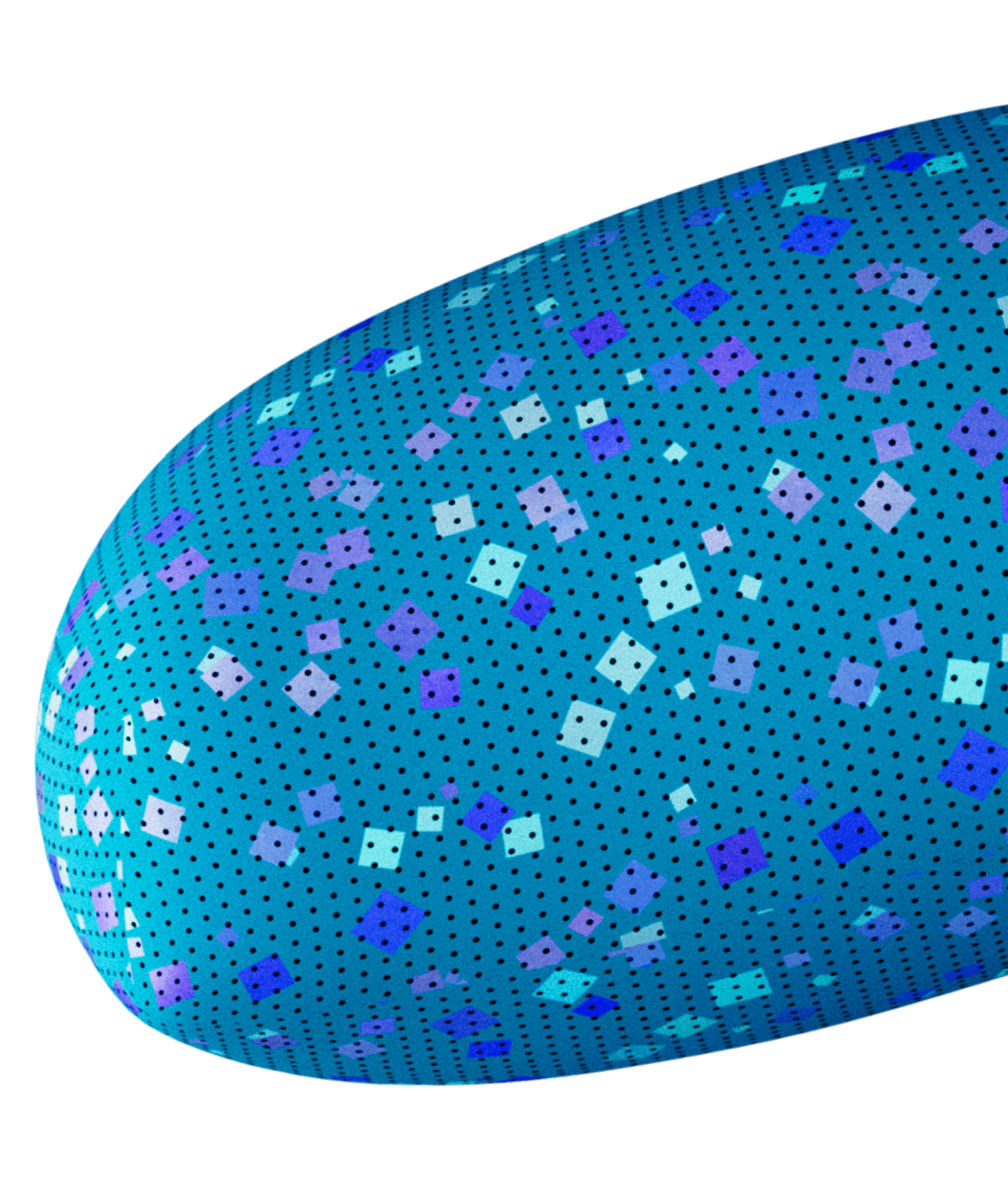Issue 04 / Exploring Joy, Reimagining Resilience
Flourishing In and Out of Office
An Interview with Alice Katter
15 min reading time
15 min read
A new, more joyful and sustainable concept of resilience isn't just a personal responsibility. It's a cultural one, and deeply entwined with the changing nature of work.
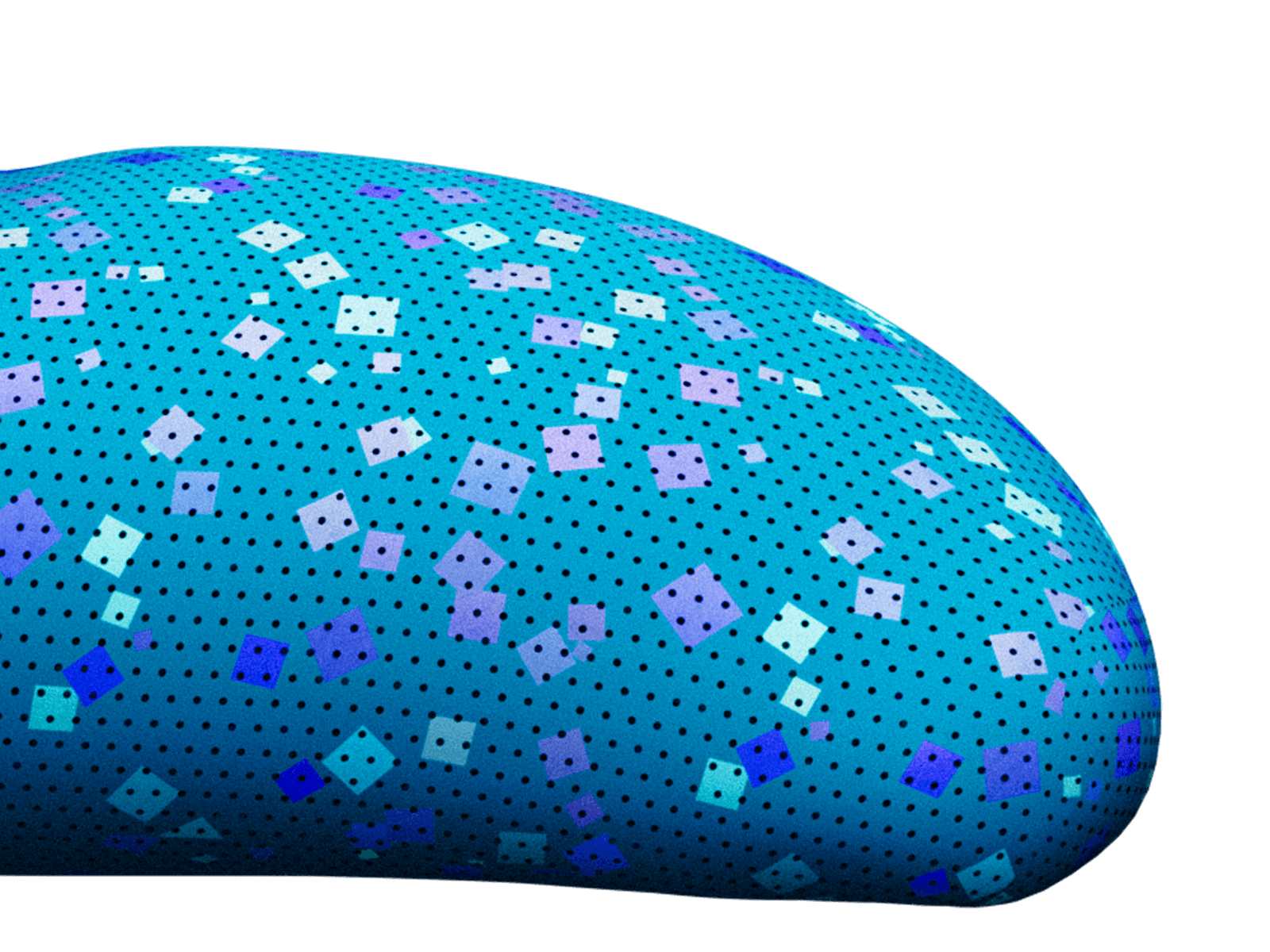
Doingthingsoutsideofworkmakesusmorecreative,betteratproblem-solving,andbroadensourperspectivetogeneratenewideas.
To learn more about creativity and wellbeing in the workplaces of the future, the Athena Jones team talked with culture and community strategist Alice Katter, a consultant and thought leader who investigates the blurry lines between life, work, and our humanity. Our conversation below ranged from remote work to Katter's favorite tools for fostering belonging.
Athena Jones
Having traveled extensively from a young age you have a unique perspective on what it means to be “out of office.” When did you become interested in the ways people work?
Alice Katter
Maybe because I was lucky to travel a lot from a young age, I was always curious about different cultures and living in different countries. I started my journey by studying the human psyche and got my degree in psychology. At the same time, I always did a lot of things outside of work to explore my curiosities (which included moving to London, after that, Vienna and later to NYC), and bring people together; from organizing team and community breakfasts and learning lunches, joining creative networks, running creative community events such as Creative Mornings Vienna, to organizing Sunday brunch gatherings for more than 100 people, and even opened up my own coworking space for creatives in Vienna.
When I went freelance, and gained a lot of flexibility in setting up my day-to-day, I was visiting friends and attended conferences and events in different cities. And it was at a coworking retreat in Cape Town where I realized how this way of living - getting new inputs by experiencing or seeing new things, as well as having conversations with different people - constantly inspired my work. I learned how the balance and interplay between work and 'play' is the 'secret sauce' that fuels my creative energy.
So I started researching about it, and found evidence for the power of “play” and “creative exploration” and that doing things outside of work makes us more creative, better at problem-solving, and broadens our perspective to generate new ideas. That's when I started Out of Office as a playground to explore this topic further and actively became interested in the ways people work. I got curious about how we can design a culture of work that celebrates the values of rest, exploration and play, in order to kindle creativity, wonder and surprise. I wanted to explore how we can remove the barriers to creativity, innovation and serendipity in our own thinking, work-lives and workplaces.
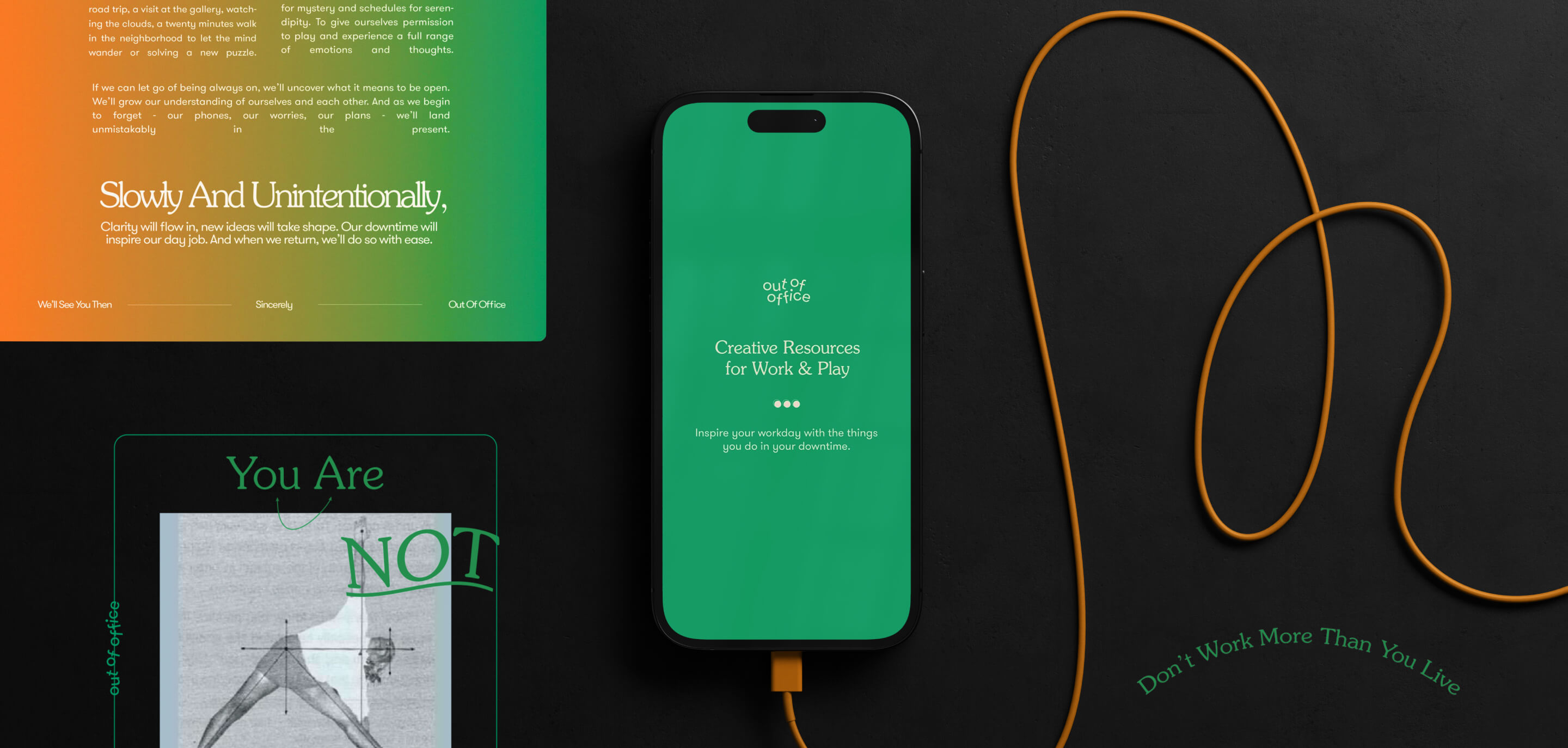
AJ
American work culture notoriously celebrates many habits that other countries avoid. How do your ideas about play, wellbeing, and exploration perhaps advocate for a new kind of work culture here in the States?
AK
By moving to the US, and learning the vocabulary of “workism” and being exposed to its always-on culture of work, I realized that mystery, wonder and surprise are the emotions most undermined by it. If we are absorbed by our work and the daily grind, we avoid creating space for exploration, discovery, serendipity and wonder, and with that, space for inspiration and new ideas. At the same time, workplace productivity suffers and people feel burned out, disengaged, depleted and ultimately, quit their jobs.
That's why now more than ever, I believe that workplaces of the future must not only provide for the productivity needs of their people, but must also help people create and grow relationships and networks, build a sense of belonging, and foster an environment in which they can feel inspired and explore different aspects of themselves - which are all important components for us to thrive and be well.
I believe that we, as organizations as well as individuals, need to shift our perspective to play and exploration not being distractions. They are a source of energy and empowerment. Exploration is the creative engine that makes us see things in a new light, fuels joy, expands what we believe is possible, and helps us learn and grow. Without creating space and permission for us to explore, learn and grow, we start to feel stagnant, frustrated, and ineffective.
With my work, I help individuals and organizations build those qualities into their culture by designing and implementing strategies, programs and tools to foster deeper connections, build networks that inspire, and provide opportunities to explore, contribute, learn and grow.
We,asorganizationsaswellasindividuals,needtoshiftourperspectivetoplayandexplorationnotbeingdistractions.theyarea sourceofenergyandempowerment.
AJ
Remote work has quickly become a reality for millions across the globe. What are some of the new challenges and opportunities for occupational wellbeing that come along with working in a remote environment?
AK
The beauty of remote work is that the flexibility and autonomy allow for different ways of living. Flexibility and autonomy in how we design our work enables us to integrate different parts of our lives and design a work environment that's more suited to our individual needs. Remote work allows us to introduce more modalities of how and where we work, and allow for more diverse ways of living. It gives us time and space to do things outside of work, and on top of that, communicates trust, which is key for occupational well-being.
On the other hand, there's certainly challenges that come with remote work. Some miss the work-life boundaries. When you live in your work space, it's easy to just keep working. So environmental behavioral changes are an interesting challenge - and with that, the tension of flexibility and boundaries to working from home. Others report feeling socially isolated and are experiencing overload, stress, and disengagement. In a recent internal culture and future of work client project, as well as conversations within my network, I heard people feel depleted, or as a friend of mine called it “creatively burned-out.” I heard leaders and managers say they feel like they can't feed their teams with more of their personal energy, and see chronically low well-being around and within themselves. But I don't think that's purely a “remote work” challenge but a challenge connected to the impact of a global pandemic, and us shifting to a new way of working that we all still don't have fully figured out. Change is hard, so it will take time for us to adjust to new ways of working.
AJ
How has the advent of remote work given new meaning to your writing and research for “Out of Office”?
AK
Out of Office isn't just about travel and living in different countries, but about looking at the world with open eyes, expanding our experiences and networks, and making space for the holistic and creative human beings we all have inside us.
Especially right now, we're in a period of profound transformation, where everything about the way we work, and the place of work in our lives, is being redefined. We can see this shift in the Great Resignation and in the trend of Quiet Quitting. The past years have left many of us rethinking the role of work in our lives and craving a model that includes work but also includes nurturing our physical and mental health, our relationships and communities, our hobbies, and our desire to slow down, explore and kindle creativity and wonder.
I believe that with more flexible forms of working, whether that's remote or hybrid work becoming more “mainstream” thanks to the pandemic, a more creative way of living and working has become more accessible for more people. We are now able to design our lives more creatively, and more suited to what it is we personally need and is nourishing to us. I believe that we are stepping into a new era of work, where we can make work more sustainable and regenerative. That's what excited me most about the future of work.

Ibelievethatwearesteppingintoaneweraofwork,wherewecanmakeworkmoresustainableandregenerative.
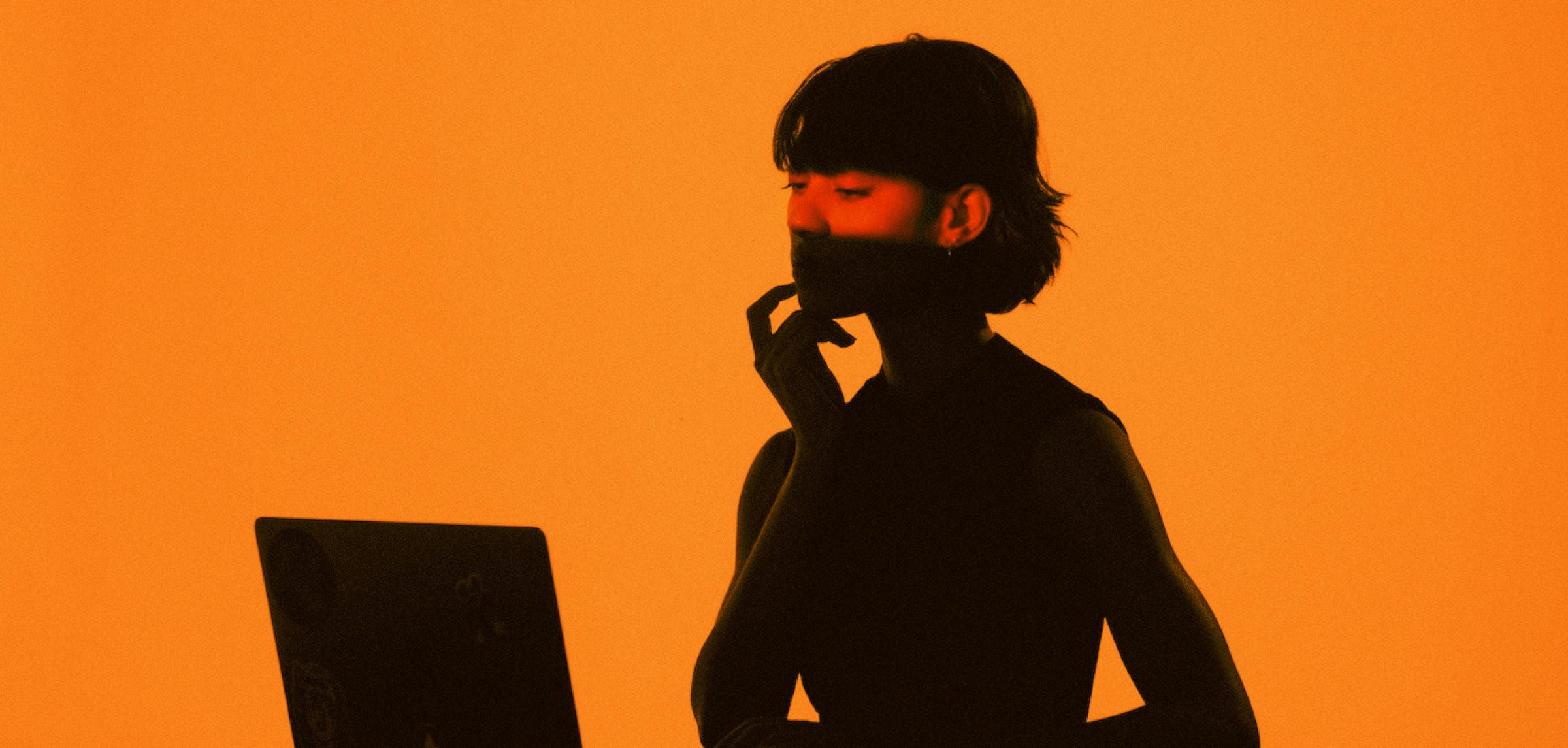
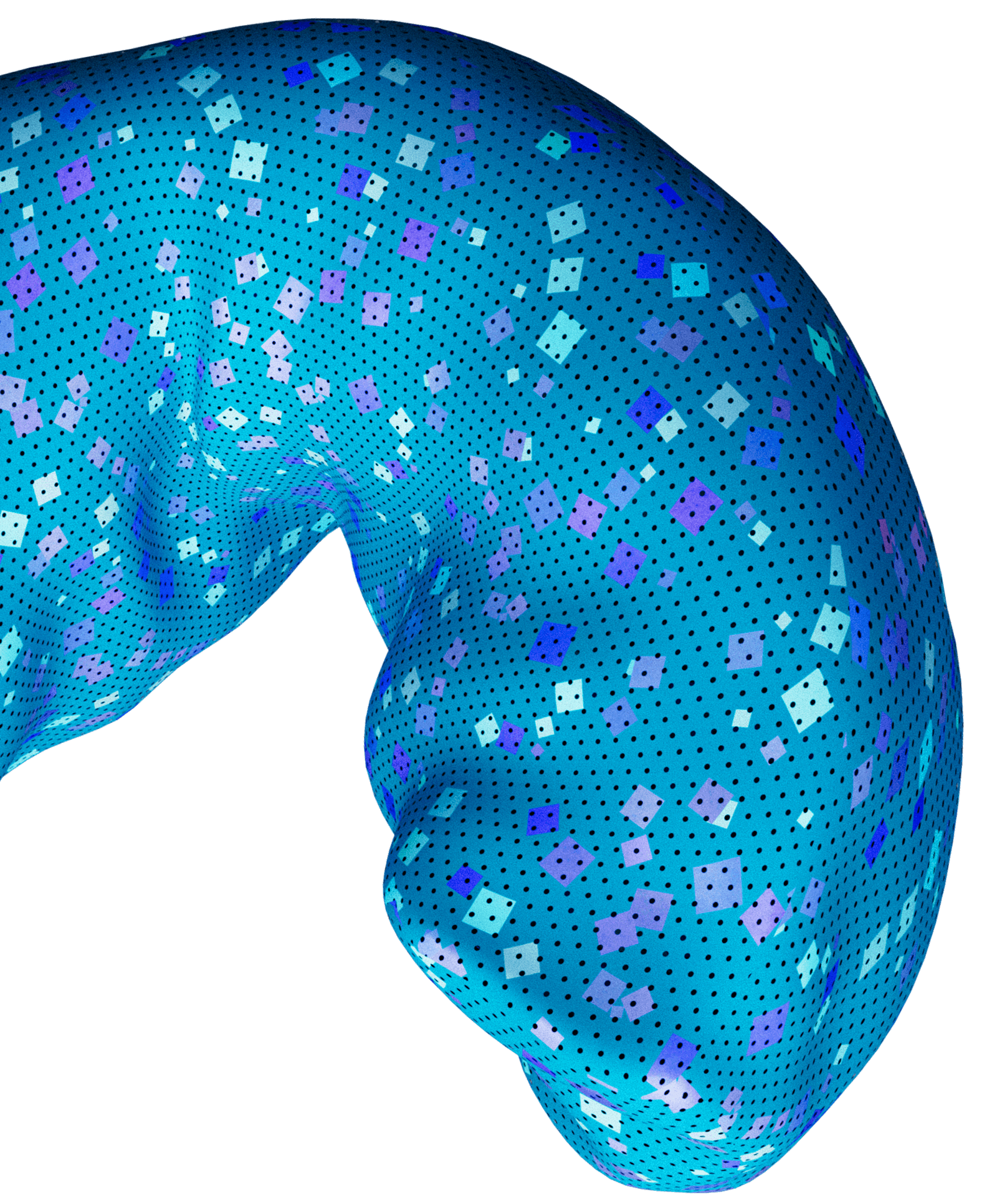
AJ
You've spent years thinking about what makes us individually and collectively flourish. How do you approach the concept of joy?
AK
Joy is essential for a positive life. Especially in a world that often feels heavy, I believe that prioritizing joy in our working lives is an important step toward creating a safe, humane place where people can find lightness, playfulness and maybe even meaning and purpose in their work. Joy also has incredible powers. It sparks creative energy, which is essential for the way we work, and is the force that drives us to be inventive, imaginative, and solve hard problems. It creates a sense of purpose and fulfillment and, particularly when sharing joy with other people, creates connection and a sense of belonging.
AJ
What is your favorite tool that you've developed through Out Of Office?
AK
Related to Joy, I created a Spirit of Joy Planner and group facilitation guide, to design space for joy, and plant the seeds for building a culture that takes joy as a priority. It focuses on the following conditions to help individuals and teams foster the experience of joy:
- A support system: This can come in the form of having the right people around you, who energize you.
- Clarity of direction and achievable goals - which can come in the form of setting goals for yourself, as well as having clarity in the direction of your work, and being aligned with where your team and company is heading.
- Space for your daily rituals, like taking a daily walk, and respecting your personal rhythm and integrating that into your work.
- Inspiration. Inspiration can come from conversations with others, music, reading, being in nature, visiting a museum or leaving your everyday context, and is often connected to experiencing a state of flow. Making time for what inspires you is a key condition that helps to spark joy.
Not a tool, but a space that brings me a lot of joy right now is something I've started just recently. It's a Learning + Playing Community to explore new ways of working and living for strategists, designers, researchers and other workplace optimists across the globe. It's a place to co-create new practices and ideas around making work more sustainable and regenerative while fostering a culture of exploration and well-being in our workplaces and our daily lives.
Bysharingourstorieswithoneanother,weexploreoursimilarities,uncoverdifferences,andlearntoconnectonadeeperlevel.
AJ
You also have deep experience in helping clients build community. In your perspective, what does it mean to have a supportive community at work?
AK
Having a supportive community at work to me means being accepted fully within a group of people where members identify with one another and share common values, feel like they belong, feel emotionally safe and included and genuinely care. It means having a network of people that is keen on trying something new together, provide opportunities and safe spaces for growth and discovery and that keeps us inspired.
AJ
How does making space in our lives to explore and play enhance a feeling of belonging with the people and the world around us?
AK
Belonging is fostered through connections and a shared sense of purpose. The principles of exploration and play allow us to build new connections and engage with people in a low-stakes environment, which also makes it easier to show different parts of ourselves.
For teams, moments of play can foster stronger bonds, help people get to know each other better, and create an environment to bring in levity and fun. Awareness of a team member's life both within and outside of work can help us appreciate our similarities, explore differences and, especially in a remote world, see that we're not just digital representations but holistic human beings.
"Community Play" (as I like to call it) and “special programs" are a way to explore, collaborate and with that, build networks, and unleash creative energy as a team or group of people. They provide us with opportunities to build healthy bridges between people, making encounters more human by forming a common purpose. A recent example is a community program I formed for kyu, a holding company and collective of best-in-class creative companies. I designed a program/playground that enables cross-company learning, co-creation, and catalyzes a collective approach and POV to the now and future of work. Activities included running research projects, designing tools, and bringing out collective intelligence so that practitioners across different companies have a space to experiment, co-create, and learn from each other. And with Dropbox Design, I built different programs, from a monthly "Design Salon" co-hosted by a rotation of different teams, to "Culture Kits" and a Design Blog that helped employees explore themes they were curious about beyond their day-to-day work.
You can try to build these qualities into your culture by having ping pong tables, free pizza or taco lunches, but ultimately what we will have to ask is: Do people have the flexibility and autonomy to make work work for them? Do they have opportunities and networks that keep them inspired, learning and growing? And do they feel like they belong?
